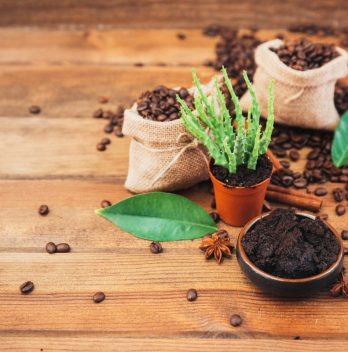If coffee preparations are one of your daily habits, are you aware that’s a fantastic source of organic matter? The use of coffee grounds in your garden can help some plants, especially vegetables flourish. So let’s look into the list of vegetables that like coffee grounds.
Even though coffee grounds are a great organic matter for your garden, they aren’t ideal for all types of plants. Some plants will benefit greatly from coffee grounds while others may not benefit from them.
This is why you must be aware of the plants that will especially benefit from coffee grounds. So, in this article, we will be looking at the list of vegetables that are like coffee grounds.
What Are Coffee Grounds?
Coffee grounds also known as green composts are the sediment or residue that remains after brewing coffee. They are rich in nitrogen which is an important constituent of plant nutrients. Coffee grounds not only add organic matter to your
They contain caffeine and they tend to be acidic. Therefore, their acidic feature should be part of the things to consider when using coffee grounds.
Coffee grounds can change the pH of your
Already used coffee grounds are sparingly acidic. Freshly made (unbrewed) coffee grounds tend to be more acidic.
Technically, there are two types of coffee grounds, they are:
- Used coffee grounds which are the final product from composting coffee residue or dregs.
- Then we have the raw coffee grounds which are fresh acidic dregs that have no additives.
What Vegetables Like Coffee Grounds?
Coffee grounds are great for growing many vegetables because a lot of vegetables thrive in acidic
Coffee grounds will provide some essential nutrients for your plants’ growth. This essential nutrient includes nitrogen, calcium, potassium, iron, magnesium, phosphorus, and chromium. These nutrients are very important for a plant’s optimal healthy growth.
You can either use fresh or used coffee grounds in your garden. Fresh coffee grounds tend to be acidic naturally therefore they favor acid-loving plants. However, you can simply neutralize this acidic level by composting it or using eggshells.

Different plants have their preference and will thrive in either fresh coffee grounds or used coffee grounds.
The plants that thrive well under the use of coffee grounds can be divided into 4 groups. They are:
- Edible crops and vegetables: berries, carrots, radishes, tomatoes, broccoli, sweet potatoes, and pepper.
- Flowers: roses, lilies, trillium, Japanese iris, camellias, and daffodils.
- Trees: magnolia, pin oak, beech, and willow oak.
- Shrubs: holly, azaleas gardenias, and rhododendrons.
List Of Vegetables Or Plants That Like Coffee Grounds
If you’re wondering which vegetables like coffee grounds, we have listed 7 vegetables that will thrive and benefit from the addition of coffee grounds. They are:
1. Sweet Potato
Sweet potatoes are acid-loving plants so they will benefit from the use of coffee grounds. The addition of coffee grounds to sweet potatoes will yield a quick result. Sweet potatoes can be grown both in your outdoor garden and indoor garden.
2. Broccoli
Broccoli is another great vegetable that is like coffee grounds. Broccoli can be grown all year long and it offers amazing vitamins such as Vitamin A, C, K, B1, and B6. It can also boost the immune system and help the digestive system. Broccoli also assists in preventing birth defects, high blood pressure, and cancer.
NEW OXO Good Grips Easy-Clean Compost Bin – 1.75 GAL/6.62 L
This veg will flourish in moderate or slightly chilly weather that corresponds to spring or fall.
3. Tomatoes
Tomato plants will also benefit from the addition of composted coffee grounds. Coffee grounds have an abundance of nitrogen that enhances the development of healthy roots, tissue growth, and chlorophyll production.
However, you should note that tomatoes do not flourish well in fresh coffee grounds because it tends to be more acidic. They would rather benefit from already-used coffee grounds that have a slightly acidic level.
4. Carrots
Carrot is another vegetable crop that will thrive well in coffee grounds. Simply mix the coffee grounds during the process of grinding to assist in the production of strong tubers for your carrots.
5. Berries
Berries such as blueberries and strawberries benefit from the coffee grounds supply. The release of a high level of nitrogen helps the plant thrive.
6. Pepper
Adding coffee grounds to your pepper plant will as well boost healthy growth.

7. Radishes
Radishes are a type of tuber crop that will benefit from coffee grounds.
List Of Flowers That Like Coffee Grounds
Let’s further look into other plants such as flowers that like coffee grounds.
Trilliums
Many flowers tend to be acid-loving. Flowers such as trilliums will blossom adequately in a well-draining, moist, acidic
Roses
Roses will thrive well in coffee grounds addition. However, you should use only a moderate amount of it as this can help invite worms that will loosen your
Daffodils
Daffodil flower also known as trumpet narcissus is another plant that will flourish from the addition of coffee grounds. The application of coffee grounds will greatly affect the growth of this flower. It will as well enhance drainage, air circulation, and water retention.

Japanese Iris
Japanese iris also loves coffee grounds in addition to their plant. It is an easy-to-care flower that thrives or loves damp conditions. The Japanese iris flower is capable of thriving even in poorly draining soil. they love acidic soils so you can always add coffee grounds to their
Which Vegetables Don’t Like Coffee Grounds?
Coffee grounds can be a good source of nutrients for some plants, but some vegetables may not benefit. Here are a few veggies that may not do well with coffee grounds:
Beets: Coffee grounds may make the
Potatoes: This veggie can tolerate
The effects of coffee grounds on plants vary. Factors like the type of plants, amount of coffee grounds used,
How Much Coffee Grounds Can I Put Around Tomato Plants?
Coffee grounds can be a good source of nutrients for tomato plants when used in moderation. Tomatoes prefer a pH range of 6.0 – 8.0. If you add too much coffee, the
As a general guideline, you can use about 1 cup of coffee grounds per 20 square feet of
How Long Does it Take For Coffee Grounds to Compost?
The time it takes for coffee grounds to compost depends on several factors. These include the size and moisture content of the
Coffee grounds generally take a few weeks to months to fully compost. If you want to speed up the process, follow these tips:
Step 1: Shred the coffee grounds into smaller pieces, and add them to a balanced compost pile. This will increase the surface area of the grounds and allow them to decompose more quickly.
Step 2: Regularly water the compost pile. Water will help activate the decomposer microorganisms in the compost pile.
Step 3: Turn the compost pile at least twice a week. This will help aerate the pile and speed up decomposition.
If you follow these steps, your coffee grounds will compost faster and more efficiently.
How Often Can You Put Coffee Grounds On Your Plants?
Over-fertilizing coffee grounds can make your
Start with small amounts
Use a small number of coffee grounds on your plants at a time. You can gradually add more if you see it’s working.
Monitor the pH of your soil
Regularly test the pH of the areas where you added coffee grounds. Coffee grounds have lower pH, so you should ensure it stays in the appropriate range for your plants before adding more.
Use coffee grounds as a supplement
Do not replace your regular fertilizer with coffee grounds. You should only use it as a supplement in your plants’ normal fertilization routine.
Are Coffee Grounds Good for Asparagus Plants?
Using coffee grounds alone could inhibit your asparagus plants. However, mixing it with organic matter and using it in moderation could be beneficial.
Asparagus plants prefer slightly acidic
Final Say
The addition of coffee grounds to your garden
Some of the lists of vegetables that are like coffee grounds include broccoli, sweet potato, carrots, berries, tomatoes, and pepper.
FAQ’s
Which vegetable plants benefit from coffee grounds?
Coffee grounds can be used as a fertilizer. Coffee grounds are the most efficient and effective compost activator, and they are also an excellent source of nitrogen, potassium, magnesium, calcium, and phosphorous. Coffee grounds can be added to the soil as a top dressing or sprinkled over the plants as a foliar spray. Coffee grounds should not be applied directly to the plant’s roots as they may encourage fungal diseases. However, coffee grounds can be mixed into compost and then used as a top dressing.
It is an excellent substrate for the production of leguminous crops such as beans. Others include carrots, tomatoes, broccoli, sweet potatoes and radishes.
Do cucumbers like coffee grounds?
Yes, they do because cucumber plants grow well in warm, humid weather and they do best when the soil is slightly acidic.
They are easy to care for and very forgiving when it comes to soil and water conditions. Cucumbers like a lot of sun, but will tolerate some shade. They prefer warm temperatures and love humidity. They don’t like frost or extreme cold weather. So, be careful not to overwater them. Too much moisture can cause the leaves to turn yellow and the fruit to rot.
How do you use coffee grounds on tomato plants?
Coffee grounds are a natural product, and if used properly, they can be beneficial for your plants. You can sprinkle them around the base of your plants or even add them to the compost bin.
Coffee grounds are an excellent fertilizer for tomatoes, and will help to ward off fungal disease.
You may use coffee grounds as a foliar spray in the summer months, but they must be diluted with water before being sprayed.
Can I Sprinkle used coffee grounds on my plants?
Yes, you can. You can add used coffee grounds to the soil in order to help keep down insects and other pests. It will also improve the soil by increasing the nitrogen content of the soil.
Can I use coffee grounds in my herb garden?
Yes, you can use coffee grounds for your herbs. The grounds will break down and add a little organic fertilizer to the soil.
In addition, the grounds will give off a strong aroma that will deter animals from eating your plants. You can make your own coffee grounds by putting ground coffee into a paper bag and setting it outside for several weeks. If you don’t have time to wait for the coffee grounds to break down, you can buy them pre-ground. Look for coffee grounds that are labeled “compostable.”






